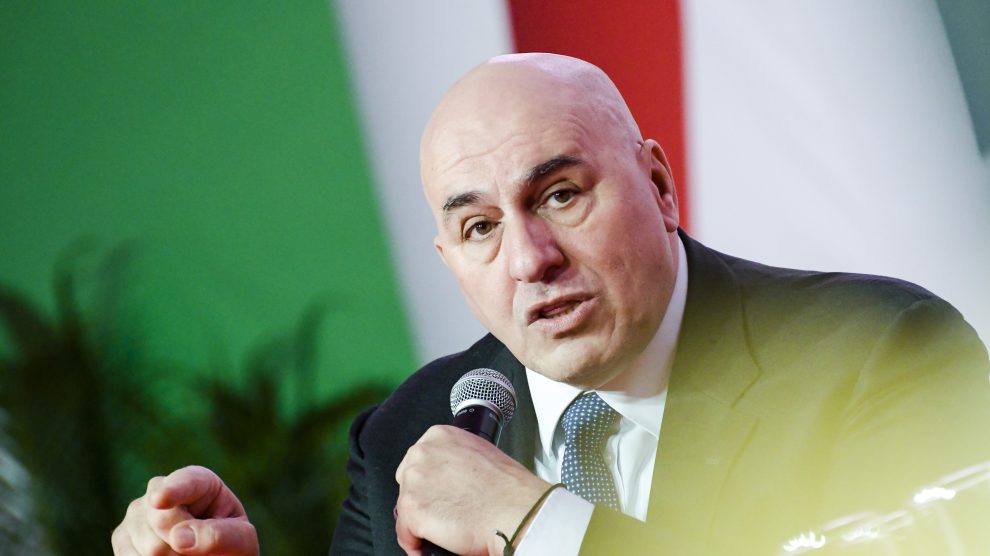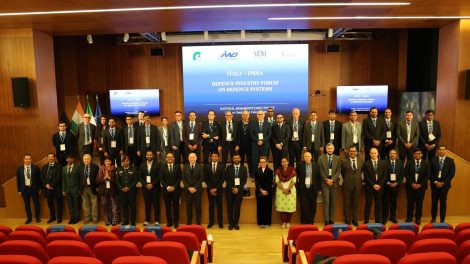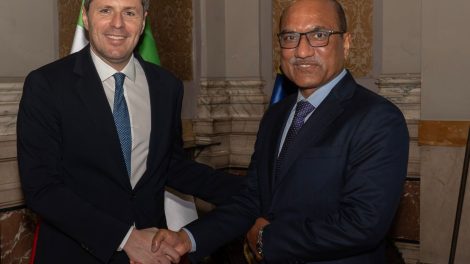The following are key excerpts from our sister website’s Italian-language interview with Defence Minister Guido Crosetto. Find the entire, fully translated interview below.
On Italy’s support of Ukraine. “The war unleashed by Russia threatens the values of peace and stability which have characterised the European continent since the end of World War II […] Italy and its highest democratic institutions (government and parliament) reaffirm their will to continue supporting Ukraine and to heal the wound of blood and barbarity that has been opened in the heart of Europe.”
- “Our country is contributing to Kyiv’s resistance by sending aid that is not just military equipment, but also civilian equipment, such as generators to light up the cities again.”
- “We have a moral duty to continue supporting the Ukrainian people, to achieve a just and truthful peace that respects international law and the self-determination of peoples, their freedom to decide to live freely and peacefully.”
On Italy’s international positioning. “Prime Minister Giorgia Meloni has always been very clear in reiterating that Italy is strongly placed in the Western Alliance and in Europe: the commitments that our country has made, and has kept for decades, will be respected and honoured.”
On the Global Air Combat Programme. It can be “an important driver for trade and economic relations between Rome and Tokyo” and “have significant spill-over effects on production sectors, including the civil sector, and research and development.”
- “Additionally, we must work on the hypothetical merging of the GCAP programme with the Franco-German-Spanish one: security-wise, and beyond, the Euro-Atlantic and Indo-Pacific areas are inseparable and closely connected.”
On the Balkans. “The aim is to get Kosovo and Serbia to sit at a table and reach an agreement without either of them feeling, in the end, treated differently from the other. The organisation of the Balkans Conference, which will be held in Trieste in the next few days, goes precisely in this direction: Italy, together with its allies, wants to promote a series of political initiatives that can ease frictions and disagreements, moments of tension, involving Serbia and Kosovo more and more towards a path of European integration.”
On the Mediterranean. “[The area’s] security is strategic for Europe and for all the countries bordering the basin. Let us remember that vital communication backbones, energy supplies and trade routes pass through the Mediterranean. I am firmly convinced that Europe must invest effectively in Africa, because only by fostering growth in its per capita GDP, economy and culture will we be able to contribute to ensuring the stability and growth of the entire continent, thus helping to reduce tensions in the Mediterranean basin as well.
- African economic growth is a precondition to solve existing issues, such as migration, “as well as the economic, commercial and geopolitical penetration of other countries that are our competitors and rivals. Unfortunately, Europe invests seven-fold what China invests in Africa and twenty-five times what Russia invests, but with extremely different results.”
On European defence. “NATO is the foundation of collective defence for its members and for Euro-Atlantic security. At the same time, the Alliance recognises the value of a stronger and more effective European Defence that contributes to global and transatlantic security, in a complementary and inter-operational manner vis-à-vis NATO.”
- “We are working to strengthen synergies to build a more competitive Europe in the area of defence industry – for instance, by stimulating cooperation programmes. We are convinced that European defence is a pillar in the Western security structure. However, first and foremost, we need a shared foreign policy and common intentions across the entire EU political community.”
A few hours before our sister website Airpress spoke with Italy’s Defence Minister Guido Crosetto, he had a phone call with US Secretary of Defence General Lloyd Austin, who praised Italy’s commitment to Ukraine. In fact, numerous international interlocutors had kind words and accolades for Minister Crosetto in just a few months of government. The reason may be found in the insights he expressed in this exclusive interview. As he explains, it’s not just a question of fully supporting Ukraine: there is a structured action that sees Italy and its government as protagonists on a global level. From Japan to the Balkans, via Israel and Iraq.
Minister Crosetto, February 24, 2023 will mark one year since Russia invaded Ukraine, shattering Europe’s certainties and causing terrible suffering to the Ukrainian people. Italy has been, together with the US and its allies, among the countries closest to Kyiv and the defence of its democracy, including by means of sending military aid. How will Rome’s commitment continue?
In the face of Russian aggression against Ukraine, Italy could not stand still and remain indifferent. So, in agreement with the international community and our main partners (NATO and the EU), it has rightly decided to help the Ukrainian people. The war unleashed by Russia threatens the values of peace and stability which have characterised the European continent since the end of World War II, the peaceful coexistence of nations, the UN Charter and the principles of integrity and inviolability of territorial borders that cannot be changed by aggression, acts of force, in defiance of international law. For all these reasons, our country is contributing to Kyiv’s resistance by sending aid that is not just military equipment, but also civilian equipment, such as generators to light up the cities again.
Let me also say one thing: in the face of war, there should be no divisions between majority and opposition. There are Italy and the actions of its governments and the resolutions of its Parliament, which has decided to complete the implementation of the fifth aid decree established by the previous government in 2022, by an overwhelming majority and in the wake of full institutional continuity. Just the last few days, this commitment received full coverage with a new parliamentary resolution for the whole of 2023, in view of another, sixth decree. In essence, Italy and its highest democratic institutions (government and parliament) reaffirm their will to continue supporting Ukraine and to heal the wound of blood and barbarity that has been opened in the heart of Europe.
During the next meeting of the Ukraine defence contact group, in Ramstein, Germany, we will decide together with the Allies on sending further aid, which will be included in a possible sixth decree on the Italian side. Prime Minister Giorgia Meloni has always been very clear in reiterating that Italy is strongly placed in the Western Alliance and in Europe: the commitments that our country has made, and has kept for decades, will be respected and honoured. One thing is certain: we have a moral duty to continue supporting the Ukrainian people, to achieve a just and truthful peace that respects international law and the self-determination of peoples, their freedom to decide to live freely and peacefully.
The Italian collaboration with Japan on the sixth-generation fighter jet (GCAP) projects Italy directly into the Indo-Pacific region. An interest that’s military in nature, as well as industrial. What will be Italy and Tokyo’s moves in that area?
Japan is a friendly nation and a partner of central and strategic importance for Italy’s interests. A bilateral foreign-defence consultation mechanism between our two countries will also be launched soon. The agreement signed by the governments of Italy, the United Kingdom, and Japan for the development of a sixth-generation aircraft (Global Combat Air Programme) can be an important driver for trade and economic relations between Rome and Tokyo. The programme will have significant spill-over effects on production sectors, including the civil sector, and research and development. Italy, however, will only be able to pursue this path if it has an equal share of the burden among the three partners mentioned. Additionally, we must work on the hypothetical merging of the GCAP programme with the Franco-German-Spanish one: security-wise, and beyond, the Euro-Atlantic and Indo-Pacific areas are inseparable and closely connected.
Are the outbreaks in the Balkans a cause for concern for Rome? And what kind of commitment does the government intend to put in place to avert further escalations?
Over the last twenty years, the presence of Italian contingents in the KFOR mission has been indispensable for the stability of the Balkans. With about eight hundred soldiers, including the Army and Carabinieri, we are the largest contributing country to the mission. In October we took its command for the thirteenth time, a clear sign of how central our presence, and our leadership, is considered in that area. We want to resume a strategic role that is also fundamental for normalising the current situation of diplomatic tension between Serbia and Kosovo.
For this reason, Minister Antonio Tajani and I went to Serbia and Kosovo last November. It was the first time for a Defence and Foreign Minister together. This indicates the attention that our country pays to this part of Europe, which is too important to leave alone at a time of difficulty. The aim is to get Kosovo and Serbia to sit at a table and reach an agreement without either of them feeling, in the end, treated differently from the other. The organisation of the Balkans Conference, which will be held in Trieste in the next few days, goes precisely in this direction: Italy, together with its allies, wants to promote a series of political initiatives that can ease frictions and disagreements, moments of tension, involving Serbia and Kosovo more and more towards a path of European integration.
The risk of instability in the Mediterranean is a matter of keen interest for Italy, as that sea is its natural area of projection. Rome is paying particular attention to the developments in Libya and Tunisia. In your opinion, does the solution to the problems of the Mediterranean lie in cooperation with the countries of the Middle East and the Gulf?
The security of the Mediterranean, which is of vital importance to us, is being heavily affected by the conflict in Ukraine, which in turn exacerbated pre-existing tensions. That is why I am certain the area must be guarded, as its security is strategic for Europe and for all the countries bordering the basin. Let us remember that vital communication backbones, energy supplies and trade routes pass through the Mediterranean. I am firmly convinced that Europe must invest effectively in Africa because only by fostering growth in its per capita GDP, economy and culture will we be able to contribute to ensuring the stability and growth of the entire continent, thus helping to reduce tensions in the Mediterranean basin as well.
The economic growth of Africa, with the adoption of a pragmatic and united policy by the EU, is the necessary precondition for the resolution of issues of growing dimensions, such as immigration, as well as the economic, commercial and geopolitical penetration of other countries that are our competitors and rivals. Unfortunately, Europe invests seven-fold what China invests in Africa and twenty-five times what Russia invests, but with extremely different results. China has a significant presence in Africa, as does Russia, while Europe does not.
On the Middle East side, we are paying particular attention to the stabilisation process in Iraq, which is of strategic interest for the security of the entire Gulf region. Since May 2022, Italy has held the command of the NATO Mission in Iraq, and it’s also among the main contributors to the UN mission in Lebanon. An effort that will continue into the future.
With the Abraham Accords, Israel has played a stabilising role vis-à-vis the Arab world and is expected to extend their impact further. The country is a central node for the future of the Middle Eastern region and a major partner for the Western world, with close industrial collaborations on technology and defence. In this context, do you foresee stronger ties between Israel and Italy?
The Abraham Accords represent an important step forward for peace and stability in the Middle East. Relations between Italy and Israel are of absolute importance. Even more so in this changed geopolitical scenario. Having said this, bilateral relations between Italy and Israel are of decisive importance for implementing security and cooperation activities in all sectors, including defence. Industrial cooperation between Italy and Israel, which is already very intense, is also essential. This is also thanks to the memoranda signed between the two countries in the framework of G2G agreements.
Furthermore, Italy in the Middle East is present with its soldiers in Lebanon on the Blue Line, thus contributing to the stability and security of the region. In this perspective, the agreement on the definition of the maritime borders between Israel and Lebanon, after years of intense negotiations, represents a historic achievement. It is a significant turning point in the relations between the two countries, which, as such, may represent not only a factor for stability in the region, but also for economic growth, with the exploitation of energy resources in the waters of the eastern Mediterranean.
You intervened to quell the case that was being created around the fake news launched by Russian diplomacy against Rome. Episodes of hybrid warfare and disinformation led by Russia and China are increasingly frequent. What countermeasures does the Meloni government intend to take?
Russian propaganda is allusive and tendentious against our country. It entails fake news aimed at undermining the national consensus of our public opinion in support of Ukraine. This activity, which is nothing new, represents a targeted strategy by Russia, against which Italy and its allies continue to develop tools to effectively and capillary counter disinformation, which has become an instrument of the worst denigrating propaganda. The best antidote is in-depth news reporting. This is a task that the media must always perform, even more so in this particular historical moment, so as not to run the risk of feeding, at times, the blatant propaganda.
Like that of the Russian Embassy, which claimed that we supply Ukraine with anti-personnel mines. These allegations are false and very serious. Italy has banned them for over twenty-five years and adheres to international conventions that strictly and scrupulously ban them. We strongly say “Enough is enough!” to this sort of disinformation, which comes from official Russian organs (the Russian Embassy in Italy and the Russian Ministry of Foreign Affairs). One must not invent news denigrating Italy’s good name for the purposes of military propaganda.
Or, more generally, deal with dramatic moments (such as the one we are currently experiencing) by narrating scenarios that do not exist, or provide coverage to those who have every interest in conditioning public opinion and the population’s way of thinking. Cognitive warfare employs disinformation campaigns with the dissemination of false news supported by artificial intelligence systems. In a democracy, it is crucial to prevent this from happening. To respond to these threats, the Italian Defence recently issued a document that defines the approach to operations in all domains (land, sea, air, cyberspace, and space) as well as in the information and cognitive sphere.
The newer defence domains – space and cyberspace – never seemed more crucial for conducting military operations than at this moment in history. What steps forward does Italy’s Defence still need to make in these environments?
The Russian-Ukrainian war has also forced greater attention on security and access to space and cyberspace. Without rules regulating these domains, there is a risk of interference, and non-state actors may operate by taking advantage of regulatory gaps – which must be filled as soon as possible. Moreover, it’s also hard to define whether these interventions are incidental or instead subsidised by government bodies.
As far as aerospace is concerned, we will invest seven billion over the next five years. This is a very considerable sum for the State budget. The Italian space system is a component of national and European strategic autonomy; thus, it must be constantly cultivated and relaunched to keep our country credible and at the forefront. Space is a field of growing competition in which States encounter various difficulties when acting autonomously or relying solely on their own strengths and resources. Therefore, it is necessary to play an effective role in the sector’s strategy by ensuring continuity in programmes of national interest and cooperation, both European and international. All the more reason why a global, European and planetary vision is really needed.
Prime Minister Giorgia Meloni and EU Commission President Ursula von der Leyen had a positive discussion on the National Recovery and Resilience Fund, a step forward that signifies greater understanding with Brussels. In light of this, could Italy relaunch its role within the EU’s Common Defence framework? Is this an aspiration of the Meloni executive? And where do you think we are with the European Defence project?
In the current geopolitical scenario, authoritarian actors challenge the interests of our countries using multiple instruments: political, economic, technological and military. The Joint Statement on EU-NATO Cooperation, signed a few days ago in Brussels by Charles Michel, Ursula von der Leyen and Jens Stoltenberg, emphasises that NATO is the foundation of collective defence for its members and for Euro-Atlantic security. At the same time, the Alliance recognises the value of a stronger and more effective European Defence that contributes to global and transatlantic security, in a complementary and inter-operational manner vis-à-vis NATO.
Therefore, we must avoid any unnecessary duplication, within the framework of our historical alliances. At the same time, we are working to strengthen synergies to build a more competitive Europe in the area of defence industry – for instance, by stimulating cooperation programmes. We are convinced that European defence is a pillar in the Western security structure. However, first and foremost, we need a shared foreign policy and common intentions across the entire EU political community.





